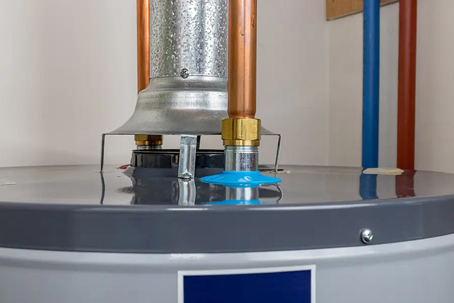You’ve probably faced the nightmare of a cold shower when you need hot water the most. It can feel like the end of the world, but don’t panic just yet. There are several common issues that might be causing your water heater troubles, and many of them are easy to troubleshoot. Understanding these problems can save you time and money, so let’s explore some key steps to get your hot water flowing again.
Identifying No Hot Water Issues
Have you ever turned on the hot water tap only to be met with a chilling surprise? It’s frustrating when you expect a soothing stream but get icy water instead.
First, check your thermostat settings; it might be too low. If that’s not the issue, inspect the circuit breaker or fuse related to the water heater. Sometimes, a tripped breaker can cut off power, leaving you without hot water.
Next, examine the pilot light if you have a gas water heater; it may have gone out. If you see nothing wrong, listen for unusual noises—these could indicate sediment build-up, affecting performance.
Lastly, check for leaks around the heater. Any significant leaks can lead to a complete failure. You might also want to consider getting a professional inspection to ensure everything is functioning safely and efficiently.
If you can’t pinpoint the issue, don’t hesitate to reach out to a professional. They can quickly identify the problem and get your hot water flowing again.
Addressing Water Temperature Fluctuations
When you notice your water temperature fluctuating unexpectedly, it can disrupt your daily routine and leave you feeling frustrated.
Fortunately, you can take several steps to address this issue effectively:
- Check the thermostat: Verify it’s set to the desired temperature, typically around 120°F.
- Inspect the heating elements: For electric heaters, faulty elements can cause inconsistent heating.
- Examine the dip tube: A broken dip tube can mix hot and cold water, leading to temperature changes.
- Flush the tank: Sediment buildup can hinder proper heating, so flushing your water heater may help.
- Look for leaks: Even minor leaks can affect water temperature, so inspect your heater for any signs.
Additionally, consider how water filtration systems can improve overall water quality, preventing issues that may arise from contaminants affecting your plumbing.
Resolving Leaks Around the Water Heater
Addressing water temperature fluctuations can sometimes lead to the discovery of leaks around your water heater. If you notice water pooling around the base, it’s essential to act quickly.
First, turn off the power and water supply to prevent further damage. Check the connections and valves; loose fittings can often cause leaks. Tighten any loose connections, but don’t overtighten, as that can create new issues.
Inspect the pressure relief valve and drain valve for any signs of leakage. If these components are faulty, replacing them is typically straightforward. A corroded tank, however, may require a full replacement. Additionally, consider how tankless systems can eliminate potential leak sources and provide a more efficient solution.
Don’t hesitate to reach out to a professional if you’re unsure or if the problem persists.
At Intelligent Service, we prioritize your safety and comfort, ensuring your home stays leak-free and secure. Your peace of mind is our promise, backed by our forever guarantee.
Troubleshooting Strange Noises From the Unit
Why are those strange noises coming from your water heater? Odd sounds can be unsettling, but they often point to common issues.
You’ll want to pay attention to what you hear, as it can help you identify the problem. Here are some noises to watch for:
- Banging or popping: Indicates sediment buildup at the bottom of the tank.
- Hissing: Could mean a leak or overheating elements.
- Gurgling: Often a sign of trapped air in the pipes.
- Sizzling: Might suggest water dripping onto hot elements.
- Whining or screeching: Usually points to worn-out parts, like valves or heating elements.
Listen closely to your water heater, and note the sounds. If they persist, consider consulting a professional from Intelligent Service to verify your unit operates safely and efficiently.
Dealing With Discolored or Foul-Smelling Water
Have you noticed discolored or foul-smelling water coming from your taps? This issue often indicates a problem with your water heater.
First, check the temperature setting; if it’s too low, it can promote bacterial growth, leading to unpleasant odors.
Next, inspect the anode rod inside your tank. If it’s corroded, replace it to prevent rust and improve water quality.
Flushing the tank regularly can also help eliminate sediment buildup, which contributes to discoloration and odors.
If the problem persists, you might need to evaluate replacing your water heater, especially if it’s over ten years old.
Don’t hesitate to reach out to professionals like Intelligent Service for guidance. They’ll assess your situation and recommend the best solution.
Your comfort and safety are paramount, so act quickly to restore clean, fresh water to your home!

Conclusion
To sum up, troubleshooting your water heater can save you time and money. Did you know that nearly 75% of water heater issues stem from improper maintenance? By regularly checking the thermostat, inspecting for leaks, and flushing the tank, you can prevent many common problems. If you find yourself facing persistent issues, don’t hesitate to call a professional for help. Keeping your water heater in good shape guarantees you enjoy hot water when you need it most!

